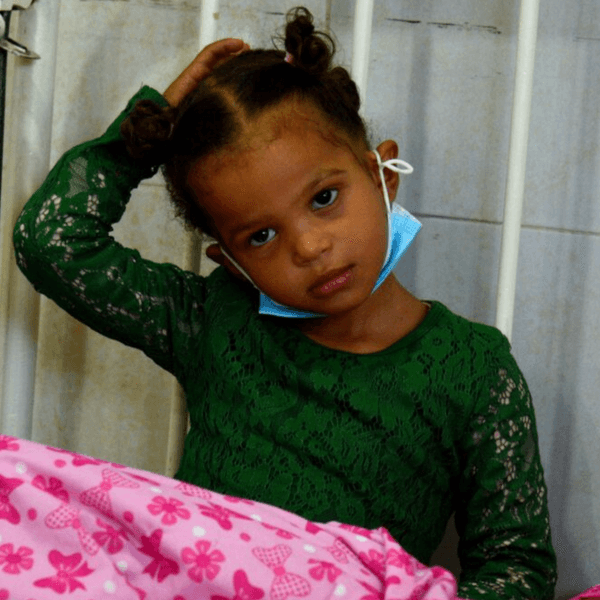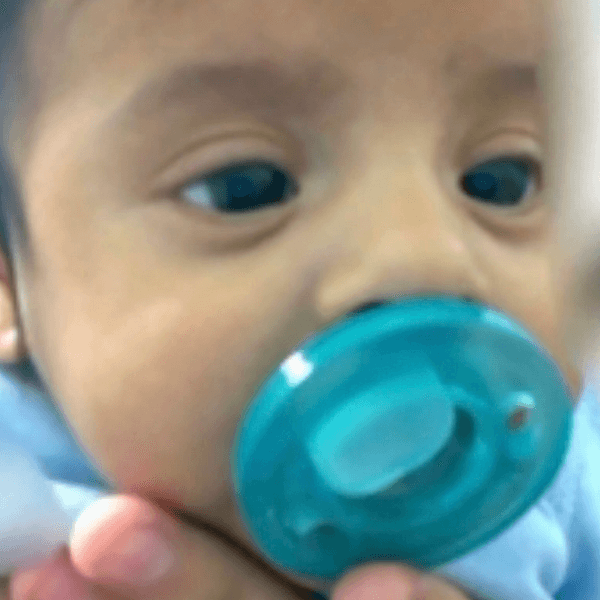
Bianey Reyes and others protest the separation of children from their parents in front of the El Paso Processing Center, an immigration detention facility, at the Mexican border on June 19, 2018 in El Paso, Texas. (Photo: Joe Raedle/Getty Images)
As CBP Orders Medical Checks for Minors in US Custody After Two Deaths, Critics Ask, 'Why Are They Jailing Children' In the First Place?
"Another migrant child dies in U.S. custody and the discussion goes to making jails and concentration camps more humane, not whether a family should be there in the first place."
As Customs and Border Protection (CBP) announced that it would order medical checks for all minors in its custody following the deaths of at least two children in recent weeks, critics expressed alarm at the neglect that children have faced in immigrant detention centers thus far--and issued reminders that they shouldn't be detained, especially for long periods of time, in the first place.
The CBP's announcement came a day after the death of an eight-year-old boy, Felipe Gomez Alonzo, was announced on Christmas. Felipe had been held for a week after being apprehended with his father by the agency. The pair had been transferred a number of times as the Trump administration sought to deport them, and the boy grew increasingly ill during the detention, developing a 103 degree fever at one point, but his symptoms were diagnosed as the common cold.
The agency is now "considering options for surge medical assistance" to care for the tens of thousands of children who have been held in U.S. custody this year after crossing the border--but critics pointed out that the overarching concern is that children shouldn't be held by the Departments of Homeland Security (DHS) and Health and Human Services (HHS) for days, weeks, and months at a time.
"The Trump administration's policies of cruelty toward migrants and asylum-seekers at the border must cease immediately before any more children are harmed," said Margaret Huang, executive director of Amnesty International USA, in a statement.
Daily Beast editor Justin Miller suggested on Twitter that regardless of the specifics of where and why each child is being detained, a national debate over how to best treat children, adults, and families in U.S. detention is a sign that President Donald Trump's treatment of immigrants and asylum-seekers has spiraled out of control.
In the case of Felipe and his father, Miller wrote, "It was civil detention apparently pending a court date for removal. In other cases (non-families), it's straight to criminal prosecution. Either way, the debate is around improving detention, not whether to detain and en masse."
An Urgent Message From Our Co-Founder
Dear Common Dreams reader, The U.S. is on a fast track to authoritarianism like nothing I've ever seen. Meanwhile, corporate news outlets are utterly capitulating to Trump, twisting their coverage to avoid drawing his ire while lining up to stuff cash in his pockets. That's why I believe that Common Dreams is doing the best and most consequential reporting that we've ever done. Our small but mighty team is a progressive reporting powerhouse, covering the news every day that the corporate media never will. Our mission has always been simple: To inform. To inspire. And to ignite change for the common good. Now here's the key piece that I want all our readers to understand: None of this would be possible without your financial support. That's not just some fundraising cliche. It's the absolute and literal truth. We don't accept corporate advertising and never will. We don't have a paywall because we don't think people should be blocked from critical news based on their ability to pay. Everything we do is funded by the donations of readers like you. Will you donate now to help power the nonprofit, independent reporting of Common Dreams? Thank you for being a vital member of our community. Together, we can keep independent journalism alive when it’s needed most. - Craig Brown, Co-founder |
As Customs and Border Protection (CBP) announced that it would order medical checks for all minors in its custody following the deaths of at least two children in recent weeks, critics expressed alarm at the neglect that children have faced in immigrant detention centers thus far--and issued reminders that they shouldn't be detained, especially for long periods of time, in the first place.
The CBP's announcement came a day after the death of an eight-year-old boy, Felipe Gomez Alonzo, was announced on Christmas. Felipe had been held for a week after being apprehended with his father by the agency. The pair had been transferred a number of times as the Trump administration sought to deport them, and the boy grew increasingly ill during the detention, developing a 103 degree fever at one point, but his symptoms were diagnosed as the common cold.
The agency is now "considering options for surge medical assistance" to care for the tens of thousands of children who have been held in U.S. custody this year after crossing the border--but critics pointed out that the overarching concern is that children shouldn't be held by the Departments of Homeland Security (DHS) and Health and Human Services (HHS) for days, weeks, and months at a time.
"The Trump administration's policies of cruelty toward migrants and asylum-seekers at the border must cease immediately before any more children are harmed," said Margaret Huang, executive director of Amnesty International USA, in a statement.
Daily Beast editor Justin Miller suggested on Twitter that regardless of the specifics of where and why each child is being detained, a national debate over how to best treat children, adults, and families in U.S. detention is a sign that President Donald Trump's treatment of immigrants and asylum-seekers has spiraled out of control.
In the case of Felipe and his father, Miller wrote, "It was civil detention apparently pending a court date for removal. In other cases (non-families), it's straight to criminal prosecution. Either way, the debate is around improving detention, not whether to detain and en masse."
As Customs and Border Protection (CBP) announced that it would order medical checks for all minors in its custody following the deaths of at least two children in recent weeks, critics expressed alarm at the neglect that children have faced in immigrant detention centers thus far--and issued reminders that they shouldn't be detained, especially for long periods of time, in the first place.
The CBP's announcement came a day after the death of an eight-year-old boy, Felipe Gomez Alonzo, was announced on Christmas. Felipe had been held for a week after being apprehended with his father by the agency. The pair had been transferred a number of times as the Trump administration sought to deport them, and the boy grew increasingly ill during the detention, developing a 103 degree fever at one point, but his symptoms were diagnosed as the common cold.
The agency is now "considering options for surge medical assistance" to care for the tens of thousands of children who have been held in U.S. custody this year after crossing the border--but critics pointed out that the overarching concern is that children shouldn't be held by the Departments of Homeland Security (DHS) and Health and Human Services (HHS) for days, weeks, and months at a time.
"The Trump administration's policies of cruelty toward migrants and asylum-seekers at the border must cease immediately before any more children are harmed," said Margaret Huang, executive director of Amnesty International USA, in a statement.
Daily Beast editor Justin Miller suggested on Twitter that regardless of the specifics of where and why each child is being detained, a national debate over how to best treat children, adults, and families in U.S. detention is a sign that President Donald Trump's treatment of immigrants and asylum-seekers has spiraled out of control.
In the case of Felipe and his father, Miller wrote, "It was civil detention apparently pending a court date for removal. In other cases (non-families), it's straight to criminal prosecution. Either way, the debate is around improving detention, not whether to detain and en masse."

